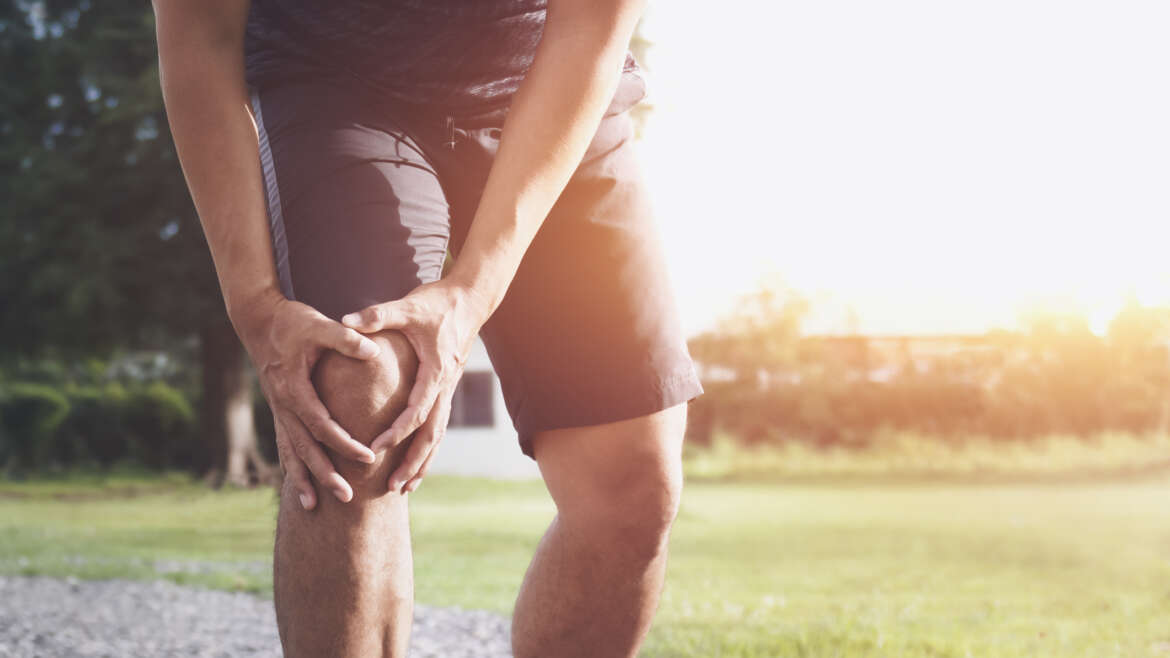One of the hardest worked and most frequently injured joints in our bodies are our knees. Whether we are crawling around tidying, running up and down stairs or out running, we run the risk of knee injury.
But please don’t use this as an excuse to sit and avoid exercise! Keeping the knees still in one position for too long can also cause issues.
What’s causing your knee pain?
Knee pain can be experienced whatever age you are. It is often felt because something is affecting the tissues, muscles and tendons that help give the knee joint controlled movement.
This can be caused during exercise or a sudden change in direction, for example, and may mean you have suffered a strain, sprain or even tendonitis. Knee pain can also be suffered without an obvious injury, such as pain and stiffness, which could be osteoarthritis.
Pain at or around the knee doesn’t mean that is where the cause of the problem is. The controlled movement of our legs is achieved by a complex series of muscles, tendons and sinews, and if some are not pulling their weight it impacts on other areas such as the knee.
One of the reasons too much sitting down is bad for you is that it can result in underdeveloped gluteal muscles (at the top of your leg). One symptom of that is knee pain.
Knee pain and over exercising
It is possible to have knee pain through over exercising or doing too much too soon. Lots of repetitive, high impact movement, such as running and jumping, or lots of bending and stretching can put a great deal of strain on your knee, resulting in pain during and after.
It’s wise to mix up high impact exercise with non-weight bearing, such as swimming or cycling. It’s even more important to not overdo the amount of exercise you’re doing. Listen to your body! This is really important if you’re returning to exercise following time away or an injury.
Don’t assume you can do as much as you could before. You will need to build up in a measured way – when running, for example, try not to add more than 10% at a time to your long runs.
How can you manage knee pain?
You can deal with knee pain caused by minor tissue damage by rest and elevation and a slow return to exercise. This will allow the tissues to recover. You should always know your limits when exercising, both when you are fit and healthy or just recovering.
If your pain isn’t as a direct result of an injury or exercising, come and see one of our Osteopaths.
What else can affect my knees?
Your shoes can have a tremendous effect, especially for those who run. No two person’s feet are the same. Some are wider than others, some people have a high instep, others have flat feet, and the way we land and take off again (pronate) can vary greatly too.
If you go for the wrong shoes, (and don’t forget you could be planning to run hundreds of miles in them) you could end up with numb toes and damaging or losing some toenails. Alternatively, you could be in agony because you wore the shoes that were wrong for the profile of your feet and that has affected internal alignment, stretching some muscles or tendons, and leaving you in great pain.
Likewise, old running shoes can really do you damage as they have lost their support as well as cushioning and grip. On average, running shoes should be replaced every 400 miles so if you’re coming to the end of yours, start wearing in a new pair gradually.
Can an osteopath help with knee pain?
If you knee pain isn’t going away by itself, and despite your best efforts you are still in pain, that is the time to seek help from an osteopath. Knee injuries can be caused by many reasons, and an Osteopath’s holistic approach can help you.
Osteopathy works by looking at how well your bones, ligaments, muscles and connective tissue are working together. Through gently manipulation and stretching, an Osteopath can help increase your knees’ mobility, relieve muscle tension and help the joint to heal naturally without invasive treatments, rebalancing the mechanics of your body to promote healing through proper alignment. To make an appointment to see one our Osteopaths for your knee pain, click here or call 020 8316 5316.


